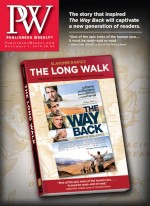Last month, Amazon—retailer of books, makeup, vacuums, and the Kindle—launched its second publishing imprint, AmazonCrossing. The imprint, like its predecessor AmazonEncore, relies on crowd sourcing, or "customer feedback and other data," in developing books for the American public and expansion of the literary canon. Unlike AmazonEncore, the imprint reaches beyond our borders, translating into English world literature deemed exceptional and deserving of a wider audience. However, AmazonCrossing's inaugural title, The King of Kahel, received this comment about the original French edition from Amazon.fr reviewer "T. Joel": "It is rare that I abandon a book due to lack of interest. This is the case for this book." The French title has eight customer reviews, and its overall rating is 3.5 stars out of 5. Clearly, Amazon relied heavily on "other data" in making this debut choice by Tierno Monémbo, translated into English by Nicholas Elliott. The book did win the 2008 Prix Renaudot in France and, one assumes, sold enough copies to jibe with AmazonCrossing's editorial algorithm.
Literature in translation has been a reliable cause of anxiety for book people, even in the face of such larger problems as the threat of Kindle-like devices eclipsing the printed book, public libraries falling to the clutches of private companies, Barnes & Noble selling more travel Scrabbles than hardcover books, and the effect of the economic downturn on literature that is expensive to print and not guaranteed to sell. With a very low percentage of international literature published in the U.S. each year, boutique publishers, imprints, and university presses assume the task of reminding readers that before Anna Karenina became a classic and an Oprah book club alum, it lived in the "literature in translation" ghetto. The National Endowment for the Arts and other national arts organizations increasingly fund translation projects in the hope of bringing new world literature into the American reader's beach bag.
While these niche publishers are consistently praised for the literature they produce, earning awards, review attention, and increased public funding, what they are not doing is selling The Girl with the Dragon Tattoo each season. It's fair to assume that Amazon, on the other hand, one of the few consistently lucrative ventures in the book industry, makes a move on a new market only if there's money to be made. I'm willing to bet that AmazonCrossing's debut list, which includes nonfiction from one of "Ukraine's Top Ten Most Influential Women" (so named by Correspondent magazine) and a novel lauded as China's Gone with the Wind, lacks the coherence, sophistication, and element of surprise that defines the lists of small translation presses. In lieu of living in Paris, working at a used bookstore, delivering pizzas by motor scooter, and devouring French literature to find one gem that has unfathomably never been published in English (as goes the history of one translation publisher I admire), the AmazonCrossing editorial outlook appears to be publishing-by-numbers.
Despite these doubts, should small translation publishers be wary of AmazonCrossing's effect on the market? Has the company devised a way to make money on translated books? With the announcement of AmazonEncore in 2009, trade publishers wrung their hands over Amazon's new publishing model that cut out the middleman. However, the fear that this model would prove agents, editors, publishers, publicists, and distributors dispensable has thus far proven to be unfounded. While Sweet Farts: Rippin' It Old School, a children's title by AmazonEncore author Raymond Bean, has enjoyed modest success, it's not a game changer. Scholastic soldiers on. Likewise, translation presses shouldn't fear the impact of AmazonCrossing on the market. If anything, expanding the percentage of books published in the U.S. from other languages (with the translator's due credit spelled out on the cover) may help to bring translation further into the mainstream. And I could be proven wrong; Amazon may have discovered a method for identifying worthy international literature that isn't muddled by crowd sourcing, that fits appropriate translators with authors, and that serves the international community.
We'll find out. In the meantime, I look forward to receiving New Directions' spring catalogue.
Kara Mason is a freelance writer and an editor at the Solomon R. Guggenheim Museum in New York.



 Volume 257
Issue 43
11/01/2010
Volume 257
Issue 43
11/01/2010





